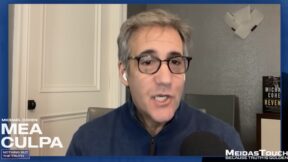‘Turned My Life Upside-Down’: Officials Recall Harrowing Threats They Faced As A Result of Trump’s Effort to Overturn 2020 Election
The House Select Committee investigating the Jan. 6 attack on the U.S. Capitol focused its inquiry Tuesday on the pressure campaign by former President Donald Trump and his allies urging local officials to help overturn the 2020 election. During the course of several testimonies, top Republican election officials and a Georgia election worker recalled the various threats they received in connection to Trump’s debunked allegations that the 2020 election was stolen.
First to testify was GOP state Rep. Rusty Bowers, the Arizona state House Speaker who voted for Trump in 2020. Bowers offered moving testimony explaining why he refused to go along with Trump’s requests to help him overturn the result of the 2020 election in Arizona.
At the end of his testimony, Rep. Adam Schiff (D-CA) asked Bowers about the threats he faced after refusing to help Trump.
“Mr. Speaker, those are powerful words. I understand that taking the courageous positions that you did following the 2020 election and defense of the rule of law and protecting the voters of Arizona resulted in you and your family being subjected to protest and terrible threats. Can you tell us how this impacted you and your family?” Schiff asked.
“Well, as others in the videos have mentioned, we received, my secretaries would say, in excess of 20,000 emails and tens of thousands of voice mails and texts which saturated our offices and we were unable to work, at least communicate,” Bowers began.
“But at home up, ’til even recently it is the new pattern, or a pattern in our lives to worry what will happen on Saturdays because we have various groups come by and they have had video panel trucks with videos of me proclaiming me to be a pedophile and a pervert and a corrupt politician,” he continued.
Bowers noted that these groups in his neighborhood are “blaring loudspeakers” and often end up “arguing and threatening with neighbors, and with myself.”
“I don’t know if I should name groups, but there was one gentleman that had the three bars on his chest and he had a pistol and was threatening my neighbor, not with the pistol, but just vocally. When I saw the gun I knew I had to get close,” Bowers continued.
“And at the same time, on some of these we had a daughter who is gravely ill who was upset by what was happening outside and my wife, that is a valiant person, very, very strong, quiet, very strong woman, so it was disturbing. It was disturbing,” he concluded, getting emotional.
Later in the day, Georgia Republican Secretary of State Brad Raffensperger recalled the pressure he faced from Trump and his allies to “find” votes to overturn the election – pressure including Trump telling him he would be breaking the law by refusing.
“Secretary Raffensperger, you wrote about this in your book,” Schiff began. “You said, ‘I felt then and still believe today that this was a threat. Others obviously thought so too because some of Trump’s more radical followers have responded as if it was their duty to carry out this threat.’”
“Tell us what you and your wife and daughter-in-law received by way of threats,” Schiff asked.
“After the election, my e-mail and cell phone were doxed. I was getting texts from all over the country,” he replied.
“And so eventually my wife started getting the texts and hers came in as sexualized texts which were disgusting. You have to understand that Trish and I met in high school. We’ve been married 40 years now,” Raffensperger continued.
“So they started going after her to put pressure on me,” he added, saying their message was, “So, why don’t you just quit, walk away.”
“So that happened. And then some people broke into my daughter-in-law’s home. My son has passed. She’s a widow. She has two kids. So we’re very concerned about her safety also,” he concluded.
Schiff then asked, so “Why didn’t you just quit and walk away?
“Because I knew that we had followed the law and the constitution. I think moments require you to stand up and just take the shots. You’re doing your job. That’s all we did. You know, we followed the constitution. At the end of the day, president trump came up short. I had to be faithful to the constitution. That’s what I swore an oath to do,” he concluded.
Finally, Georgia election worker Shaye Moss testified before the committee and recalled the threats she and her mother Ruby Freeman faced after both then-President Trump and Trump’s personal attorney Rudy Giuliani accused them by name of election tampering.
Schiff asked Moss if she had received threats after Giuliani baselessly accused her and her mother of election tampering.
“Yes. A lot of threats. Wishing death upon me. Telling me that, you know, I’ll be in jail with my mother and saying things like be glad it’s 2020 and not 1920.
“Were a lot of these threats and vile comments racist in nature?” Schiff asked.
“A lot of them were racist. A lot of them were just hateful. Yes, sir,” Moss responded.
“Mrs. Moss, how is this experience of being targeted by the former president and his allies affected your life?” Schiff later asked.
“Turned my life upside-down. I no longer give out my business card. I don’t transfer calls. I don’t want anyone knowing my name. I don’t want to go anywhere with my mom because she might yell my name out over the grocery aisle or something,” she responded, adding:
I don’t go to the grocery store at all. I haven’t been anywhere at all. I gained about 60 pounds. I don’t do nothing anymore. I don’t want to go anywhere. I second guess everything that I do. It’s affected my life in a major way. In every way. All because of lies. For me doing my job. Same thing I’ve been doing forever.
Later in Schiff’s line of questioning, he played a deposition from Moss’s mother, who described having to leave her home for two months at the FBI’s urging due to the threats against her.
“Around the week of January 6, the FBI informed me that I needed to leave my home for safety. And I left my home for safety around that time,” Freeman said.
“I stayed away from my home for approximately two months. It was horrible. I felt homeless. I felt, you know — I can’t believe this person has caused this much damage to me and my family. To have to leave my home that I’ve lived there for 21 years. You know, I’m having to have my neighbors watch out for me. You know, I have to go and stay with somebody. It was hard. With us horrible,” Freeman concluded.
Watch the full clips above





Comments
↓ Scroll down for comments ↓